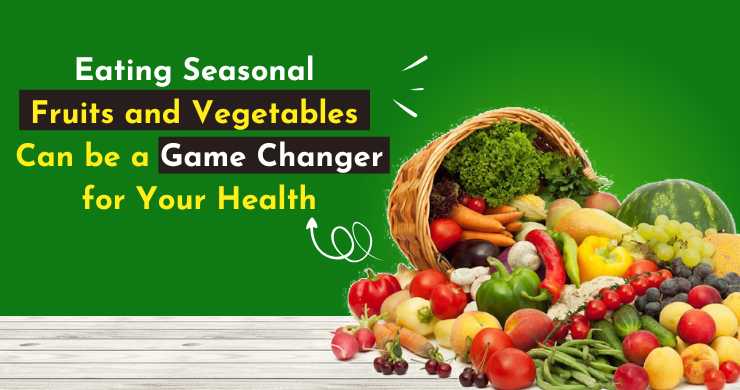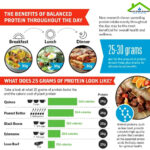
You must have heard people saying to eat fruits and vegetables that are in season. However, what do they actually mean?
Eating seasonally means fruits that are grown and harvested at the same time of the year when you consume them. These seasonal foods are not available all year around. If they do, they are not fresh and organic.
You might wonder that the supermarkets have those seasonal fruits and vegetables even in non-season, and they still look attractive and fresh. The reason being, those chains of supermarkets make that food more glossy and fresh using chemicals. These chemicals are very unhealthy and bad for health. Therefore, seasonal eating matters.
How do I know if it is seasonal food?
It may happen that you are not aware of seasonal foods. Seasonal vegetables and fruits that are available in abundance, like potatoes in the fall season, are an indication of being seasonal foods.
Secondly, if you go to a grocery store and keep a check on the prices of the foods, you may find out that prices of peaches and berries, for example, may be higher at the end of the fall season as compared to the summer season. These are some indications to understand which fruits or vegetables are in season.
So why should we eat seasonal fruits and vegetables? Well, many studies reveal that eating seasonally is beneficial for a number of reasons, and many health experts, as well as chefs, suggest including those foods to the diet that are grown at the same time of the year when you eat them.
Let us understand the benefits of eating seasonally.
-
Not too costly—beneficial for your wallet
You might have seen the difference in the cost of some foods when they are off-season. The reason being they are not available in abundance, and few supplies make it more expensive. The law of demand and supply perfectly fits here. The same seasonal foods will be available to you at cheaper rates because they are grown in abundance.
-
High in Flavour and Rich In taste
Seasonal foods are fresh, but they are actually much tastier and have a great flavour. The seasonal vegetables and fruits have been grown and picked up fresh, which satisfies the taste buds.
The seasonal food chart is a must to be followed, keeping your children in mind. Imagine the food, which has been exported, held at warehouses and supermarkets, and then it reaches you. The flavour tends to decrease at each level.
The result is you do not get a flavourful food. Having those freshly ripe peaches in summers straight from a farm would attract you more than the peaches in another season available at the local supermarket. These offseason foods are kept in refrigerators, and chilling them cuts their flavour. Seasonal foods are rich in taste and very good for your health.
-
Plethora of options
For every season you get so many food options when it comes to fruits and vegetables, and one can prepare so many dishes using them. In fact, you can widen your palate and may be exposed to some of the seasonal food dishes, which you might not have known.
Paying attention to the seasonal chart foods like carrot, lettuce, etc. gives us a variety of options to have them as salads, make smoothies, or use them in desserts. In a similar way, summer foods like berries, stone fruits, etc. can be added to salads or consumed in the form of juice. You can even make new dishes with them. So, you can get rid of food intolerances and add more dishes to your food menu.
-
Organic
Foods that are grown outside the seasonal food chart tend to be more organic and free of chemicals, pesticides, and preservatives. If the food grown is fresh, the more it is organic.
Benefits of eating organic foods contribute to a diet that is full of antioxidants. These antioxidants help in fighting against bacteria and protect us from diseases.
-
Research supports eating seasonal foods
Research conducted in the year by the Ministry of Agriculture, Fisheries, and Food in 1977 states that consuming seasonal foods tends to be much healthier and more nutritious than having the same food off-season.
There was a huge difference found in the nutrient quality of pasteurized milk in summer and winter. This was because the diet of the cows differs in both seasons. As cows could eat more fresh plants in summer and salt-preserved foods in winter, the level of iodine was much higher in milk during the winter season, while the level of beta-carotene was higher in summer. Also, as per the research study in Japan, The vitamin C in spinach harvested in summer yielded three times more in winter.
-
The cycle of Nature impacts health
The cycle of nature is meant to be like this. Seasonal foods are the ways in which we connect to more natural eating. Thus, when you eat seasonally, it keeps the body more healthy. The reason being, seasonal foods that are available in winter are supposed to make you warmer, and the summer seasonal foods tend to give you coolness. If we mix the natural cycle, it will affect our health.
-
Helpful to Local Community
There are local farmers at every place who tend to grow and harvest local seasonal foods. Some of the supermarkets do have their own farms. However, we cannot guarantee the freshness of those foods.
In fact, buying from a local farmer store not only gives you some of the freshest and most flavorsome fruits and veggies, but it will also help the local farmers and community to sustain more. Some of the farmer’s local stores may provide you with an option of more organic food, which you might prefer.
-
Beneficial to health
Seasonal fruit and vegetable eating is equal to eating fresh and natural, with no preservation, processing, or transport to anywhere. Processed food basically causes dehydration because it includes tinning and blanching. These foods are not healthy because they are steamed at high temperatures before being tinned or frozen. This process removes vitamins from foods.
Therefore, it is suggested to eat seasonal foods; they are way healthier and add variety to your diet. Moreover, seasonal fruits and veggies are budget-friendly also.
Guide for eating seasonal Food
The advantages of eating seasonal foods allow you to enjoy foods offering full nourishment. This is why it is good for you to prepare one seasonal food chart. This food chart may differ from country to country because the seasons differ in every country.

Image Courtesy: http://www.thebudgetdiet.com/buy-fruits-and-vegetables-in-season
- Winter means warmer foods. Animal products are the food for winter. Foods like Carrots, Eggs, Corn fish, Garlic, Beets, Broccoli, Brussels sprouts, Cabbage, Cardoons, Carrots, Cauliflower, Celery, Chicories, Clementines, Endive, Escarole, Fennel, Grapefruit, Herbs, Horseradish, Kale, Kiwis, Kumquats, Leeks, Lemons, Mandarins, Oranges, etc, are meant to keep you warm and winter season offer a variety of seasonal foods than any other season.
- The onset of spring seasons helps you avail more green foods like, Basil, Parsley, and Spinach, Apricots, Artichokes, Arugula, Asparagus, Beets, Carrots,Fennel, Fiddleheads, Garlic (green), Grapefruit, Green onions, Greens, Kiwis,Leeks, Lemons, Lettuce, Mint, Nettles, Navel oranges, Parsley, Pea Greens, Peas, Scallions, Spinach, Spring onions, Strawberries, Sweet onions, Turnips which must be induced in your diet for health benefits.
- Fall is the time of autumn harvest foods, which includes sweet potatoes, ginger, various seeds, Arugula, Beets, Broccoli, Brussels sprouts, Cabbage, Carrots, Cauliflower, Celery and celery root, Chart, Chicories, Chiles, Cranberries, Edamame, Eggplant, Endive, Escarole, Fennel, Figs, Garlic, Grapes, Green , eans, Green onions, Herbs, Horseradish, Jerusalem artichokes, Kale, Kohlrabi, Leeks, Lemongrass, etc.
- In summer, eat more of hydrating foods like Apple, Berries, Squash, cauliflower, Avocados, Basil, Bell peppers, Cantaloupes, Carrots, Chard, Cherries, Chickpeas, Chiles, Cilantro, Corn, Cucumbers, Eggplant, Figs, Garlic, Gooseberries, Grapes, Green , eans, Green onions, Herbs, Lettuce, Limes, Mangoes, Melons, Nectarines, Okra, Onions, Peaches, Peas, Plums, Radicchio, Radishes, Raspberries, Rhubarb, Shallots, Spinach, Spring onions, Summer squashes, Sweet Onions, Tomatillos, Tomatoes, Watermelons, Zucchini and blossoms, etc, that provides the required coolness.
The article must have now allowed you to understand why one should switch to seasonal vegetables and fruits. Make sure you prepare the chart for you and your family, which would allow you to eat more fresh and healthy foods. So, enjoy the different benefits of eating seasonal foods and please your taste buds apart from fulfilling all your nutritional needs.



